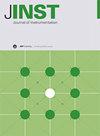A simple, flexible technique for RF cavity wake-field calculations
IF 1.3
4区 工程技术
Q3 INSTRUMENTS & INSTRUMENTATION
引用次数: 0
Abstract
Abstract It is typical in the accelerator field to model machine components, especially RF cavities, as parallel RLC resonators. To properly model wake-fields, knowledge of the time-domain voltage resulting from beam excitation is often necessary. While analytical and quasi-analytical expressions are available to accomplish this for common bunch distributions such as the Gaussian, analogous results for less standard distributions can be difficult or computationally-taxing to obtain using direct methods, which opens the door for the development of a more generalized technique. In this paper, a formulation is created that allows for the simple computation of the time-domain voltage waveform of an RLC resonator. The formulation uses the Cauchy Residue Theorem to extract the convolution result from the Fourier Domain, and if current distribution Fourier Transform has no poles, knowledge of its value is only required at one specific evaluation point. This greatly simplifies the computation of the time domain voltage for a large amount of bunch distributions both common and uncommon. Accuracy considerations for this technique and the approximation of accelerator components as RLC resonators are also discussed, resulting the development of a figure of merit for quantifying the robustness of this type of approximation.一种简单、灵活的射频腔尾流场计算技术
摘要在加速器领域,将机器部件,特别是射频腔建模为并行RLC谐振器是典型的。为了正确地模拟尾流场,通常需要了解由光束激励产生的时域电压。虽然解析和准解析表达式可用于实现常见的束分布(如高斯分布),但使用直接方法获得较少标准分布的类似结果可能很难或计算繁重,这为开发更广义的技术打开了大门。在本文中,创建了一个公式,允许对RLC谐振器的时域电压波形进行简单计算。该公式使用柯西剩余定理从傅里叶域中提取卷积结果,如果当前分布傅里叶变换没有极点,则只需要在一个特定的评估点上了解其值。这大大简化了对大量常见和不常见束分布的时域电压计算。本文还讨论了该技术的精度考虑以及加速器组件作为RLC谐振器的近似,从而得出了量化这种近似鲁棒性的优点图。
本文章由计算机程序翻译,如有差异,请以英文原文为准。
求助全文
约1分钟内获得全文
求助全文
来源期刊

Journal of Instrumentation
工程技术-仪器仪表
CiteScore
2.40
自引率
15.40%
发文量
827
审稿时长
7.5 months
期刊介绍:
Journal of Instrumentation (JINST) covers major areas related to concepts and instrumentation in detector physics, accelerator science and associated experimental methods and techniques, theory, modelling and simulations. The main subject areas include.
-Accelerators: concepts, modelling, simulations and sources-
Instrumentation and hardware for accelerators: particles, synchrotron radiation, neutrons-
Detector physics: concepts, processes, methods, modelling and simulations-
Detectors, apparatus and methods for particle, astroparticle, nuclear, atomic, and molecular physics-
Instrumentation and methods for plasma research-
Methods and apparatus for astronomy and astrophysics-
Detectors, methods and apparatus for biomedical applications, life sciences and material research-
Instrumentation and techniques for medical imaging, diagnostics and therapy-
Instrumentation and techniques for dosimetry, monitoring and radiation damage-
Detectors, instrumentation and methods for non-destructive tests (NDT)-
Detector readout concepts, electronics and data acquisition methods-
Algorithms, software and data reduction methods-
Materials and associated technologies, etc.-
Engineering and technical issues.
JINST also includes a section dedicated to technical reports and instrumentation theses.
 求助内容:
求助内容: 应助结果提醒方式:
应助结果提醒方式:


